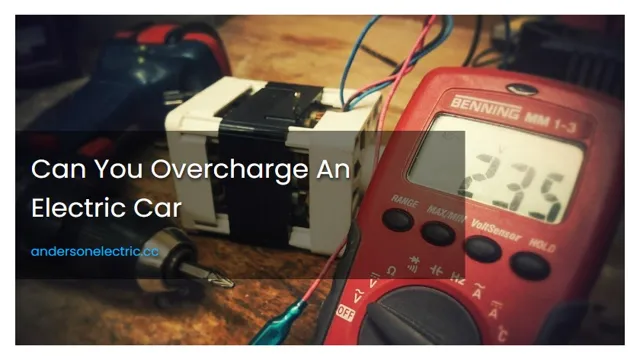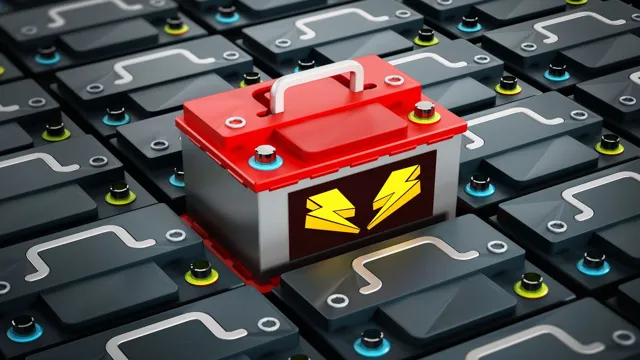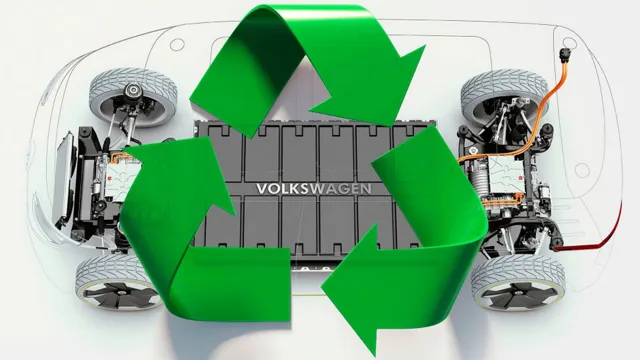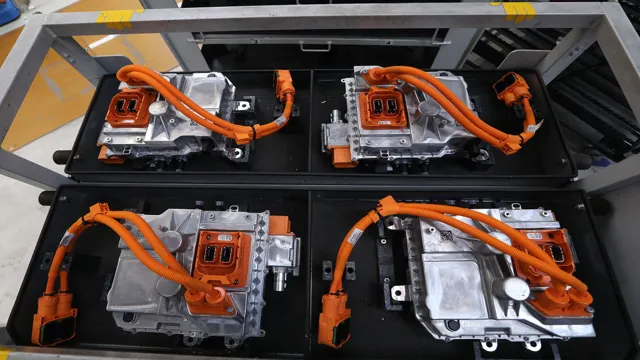Exploring Electric Car Battery Myth: Can You Really Overcharge Your Vehicle?
Electric cars are gaining popularity due to their numerous benefits like lower fuel costs, reduced emissions, and improved energy efficiency. However, with the benefits come concerns, specifically related to battery life. There is a belief that overcharging electric car batteries can harm them and shorten their lifespan.
While it may seem reasonable to assume that keeping an electric car plugged in for extended periods will damage the battery, there are some myths and facts to consider. One myth surrounding electric car batteries is that overcharging them can cause an explosion. This belief stems from incidents involving lithium-ion batteries in smartphones, hoverboards, and laptops.
However, electric car batteries are designed differently and have built-in mechanisms to prevent overcharging. Once fully charged, the battery’s charging circuit will cut off power to prevent further charging and avoid any potential safety hazards. Another myth is that overcharging electric car batteries can reduce their capacity and lifespan.
While it’s true that leaving the battery plugged in for long periods can result in a slight reduction in capacity over time, modern electric cars have sophisticated battery management systems that protect the battery from overcharging and maintain optimal charging levels. Furthermore, electric car batteries have improved significantly in recent years, with some manufacturers offering warranties of up to 10 years or more for their batteries. In conclusion, while overcharging electric car batteries may seem like a valid concern, it’s actually a myth.
Electric car batteries are designed to protect themselves from overcharging and maintain optimal charging levels, ensuring their longevity and reliability. As electric cars become more mainstream, it’s essential to separate facts from myths to make informed decisions regarding their upkeep and maintenance.
Understanding the Basics
When it comes to electric car batteries, overcharging is a common concern. Fortunately, most modern electric vehicles (EVs) come equipped with advanced battery management systems that prevent overcharging. These systems ensure that the battery is charged to its maximum capacity and then stops charging to prevent damage.
However, it’s important to note that older or poorly maintained EVs may not have these safeguards in place. Overcharging a battery can lead to reduced battery life, decreased performance, and even a risk of fire. To avoid overcharging, it’s recommended to only charge your EV up to 80% and avoid leaving it plugged in for extended periods.
Always refer to the manufacturer’s guidelines and follow best practices to ensure the longevity of your electric car battery.
How Electric Car Batteries Work
Electric car batteries operate using a system that closely resembles the standard rechargeable batteries we use in everyday life. These batteries are made up of several individual cells that each contain an anode, cathode, and electrolyte. When the battery is charged, electrons flow from the anode to the cathode through the electrolyte, creating a flow of energy.
In contrast, when the battery discharges, the flow of electrons is reversed, moving from the cathode to the anode, and releasing the stored energy to power the car. One of the critical differences between conventional batteries and electric car batteries is the size and strength of the individual cells. Electric car batteries contain much larger and more powerful cells to provide the energy necessary to efficiently power the vehicle.
Moreover, electric car batteries can be charged using either regenerative braking, where kinetic energy is converted into electrical energy while driving, or by connecting them to an external power source such as a charging station. By understanding how electric car batteries work, you can better appreciate the marvel of modern technology that allows these vehicles to operate sustainably and efficiently.
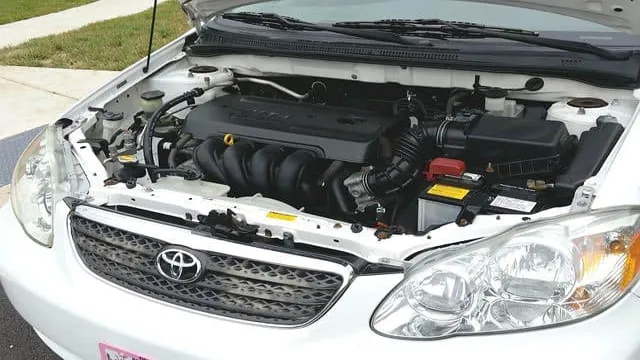
What is Overcharging?
Overcharging is the phenomenon of charging a battery beyond its maximum capacity, which can lead to various issues, including damage to the battery and even the device it’s connected to. It happens when the charging process continues after the battery has reached 100% charge. Overcharging a battery can cause it to produce excessive heat, which can damage the electrodes or cause them to deform, leading to a permanent decrease in battery capacity.
It can also lead to the formation of gas inside the battery, which can cause it to rupture or even explode. Overcharging a battery can be caused by several factors such as using a charger with the wrong voltage, using a faulty battery, leaving the battery connected to the charger for an extended period, and more. Therefore, it’s necessary to avoid overcharging at all times to ensure the longevity and safety of your battery and electronic device.
Myths and Misconceptions
One of the biggest myths and misconceptions about electric cars is whether or not you can overcharge the battery. The truth is, most modern electric cars have a built-in charging system that prevents overcharging. When the battery reaches full capacity, the charging system will automatically stop charging, which means that it won’t be possible to overcharge it.
So, if you find yourself worried about overcharging your electric car battery, you can rest assured that it’s not something you need to worry about. However, it’s important to note that if you use a third-party charging system or an older model electric car, it may be possible to overcharge the battery. To avoid this, it’s best to only use a manufacturer-approved charging system and to ensure that your electric car is up to date with the latest charging technology.
Overall, while there may be some confusion around can you overcharge an electric car battery, the good news is that most modern electric cars have built-in systems that make it impossible to do so.
Overcharging Reduces Battery Life
One of the most pervasive myths about battery life is that overcharging is harmful to your device. However, this is not entirely true. Modern devices often come equipped with protection mechanisms that prevent overcharging.
In fact, the real problem is undercharging or not charging your device properly. When your battery continually runs low or dies, it can lead to irreversible damage and reduce its lifespan. It’s essential to follow your device’s recommended charging methods and to avoid using unofficial chargers or cables that may deliver an inconsistent current flow to your battery.
Just like our bodies, our devices need proper care and maintenance to function optimally, and overcharging is not something to worry about as much as other charging-related issues.
Overcharging can Cause Explosions
When it comes to charging devices, there are many myths and misconceptions that have been floating around for years. One of the most common misconceptions is that overcharging your device can cause explosive consequences. However, this is far from the truth.
In fact, modern-day devices are equipped with safety features that prevent overcharging from occurring. When a device is fully charged, the charger will automatically stop charging. Additionally, the battery inside the device has safety features that will prevent it from becoming overcharged.
That being said, it’s always important to use the charger that is provided with your device and avoid using third-party chargers that may not meet safety standards. As long as you follow these guidelines, you can rest assured knowing that your device won’t explode from overcharging.
The Truth about Overcharging
Can you overcharge an electric car battery? The truth is, it is virtually impossible to overcharge an electric car battery. All modern electric cars are designed with advanced battery management systems that prevent overcharging and quickly detect any issues, shutting off the charging process if necessary. In fact, once the battery is fully charged, the flow of electricity is automatically stopped, allowing the battery to automatically discharge to a safe level.
Overcharging is a concern when it comes to older, less advanced batteries, but with the advent of lithium-ion batteries, this is no longer a problem. In fact, lithium-ion batteries have a built-in safety feature that automatically shuts off the flow of electricity once the battery reaches full charge. So, in short, you cannot overcharge an electric car battery, and you can have peace of mind knowing that your vehicle’s battery is safe and secure.
Battery Management Systems (BMS)
As far as battery management systems (BMS) go, overcharging is a topic that shouldn’t be overlooked. Overcharging happens when a battery receives more charge than it can handle, which can cause it to overheat, swell, and even explode. To prevent such accidents from happening, BMS systems are designed to monitor and regulate the charging process, making sure that the battery is charged correctly and safely.
BMS systems use algorithms and sensors to measure the battery’s current, voltage, and temperature and adjust the charging accordingly. So if you’re worried about overcharging your battery, there’s no reason to be. As long as you have a reliable BMS system in place, your battery will remain safe and functional, ensuring that your devices stay powered up for longer.
Overcharge Protection Features
Overcharge Protection Feature Are you worried about overcharging your electronic devices? Well, worry no more! With the advancement of technology, all the latest gadgets have overcharge protection features. This feature protects your phone and other gadgets from being overcharged and damaged. Overcharging can result in a reduced battery life and may cause the phone’s battery to swell or even burst.
Thankfully, this feature saves you the trouble of constantly monitoring your device while it’s charging. When the battery reaches 100%, the charging automatically stops, ensuring that your battery is not overcharged. As a result, the device’s battery lasts longer, and the lifespan of the device itself is extended.
With this feature in place, we can say goodbye to the constant anxiety of overcharging our devices. So, charge your device without any worries and enjoy the convenience of modern technology with the overcharge protection feature.
Conclusion
In conclusion, can you overcharge an electric car battery? Well, the answer is as elusive as a politician’s promise. Yes, you can technically overcharge a battery, but modern electric cars are designed with advanced battery management systems that make overcharging virtually impossible. So, while you may want to keep an eye on your charging habits and avoid leaving your electric car plugged in for extended periods, rest assured that your vehicle won’t blow up like a scene from a Hollywood action movie.
In the world of electric cars, overcharging is just another myth, like Bigfoot or the Loch Ness Monster. “
FAQs
Is it possible to overcharge an electric car battery?
Yes, overcharging an electric car battery can cause damage to the battery cells and reduce their lifespan.
How do you know when an electric car battery is fully charged?
Most electric cars have a charging indicator or display that shows the battery’s charging status. Once it reaches 100%, it is fully charged.
Can leaving an electric car plugged in overnight overcharge the battery?
It depends on the car’s charging system. Some electric cars have a smart charging system that stops charging when the battery is full, while others continue to charge, which can lead to overcharging if left plugged in for too long.
What are the consequences of overcharging an electric car battery?
Overcharging an electric car battery can cause damage to the battery cells, reduce their lifespan, and even pose a safety risk of an explosion or fire. It can also lead to a decrease in the car’s overall performance and range.

